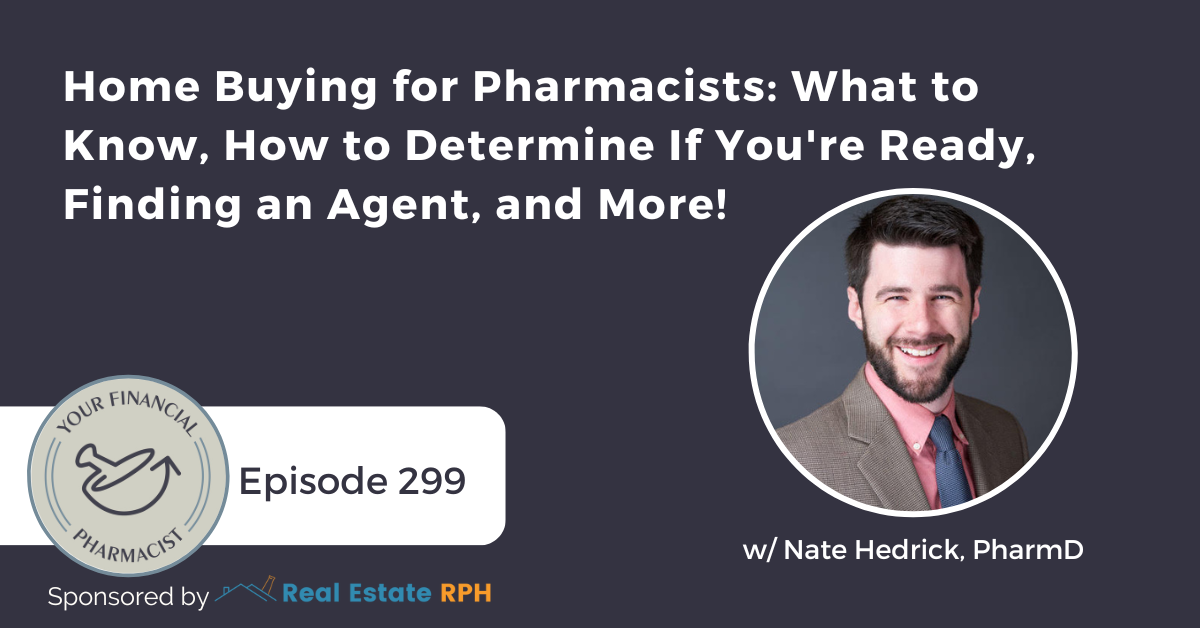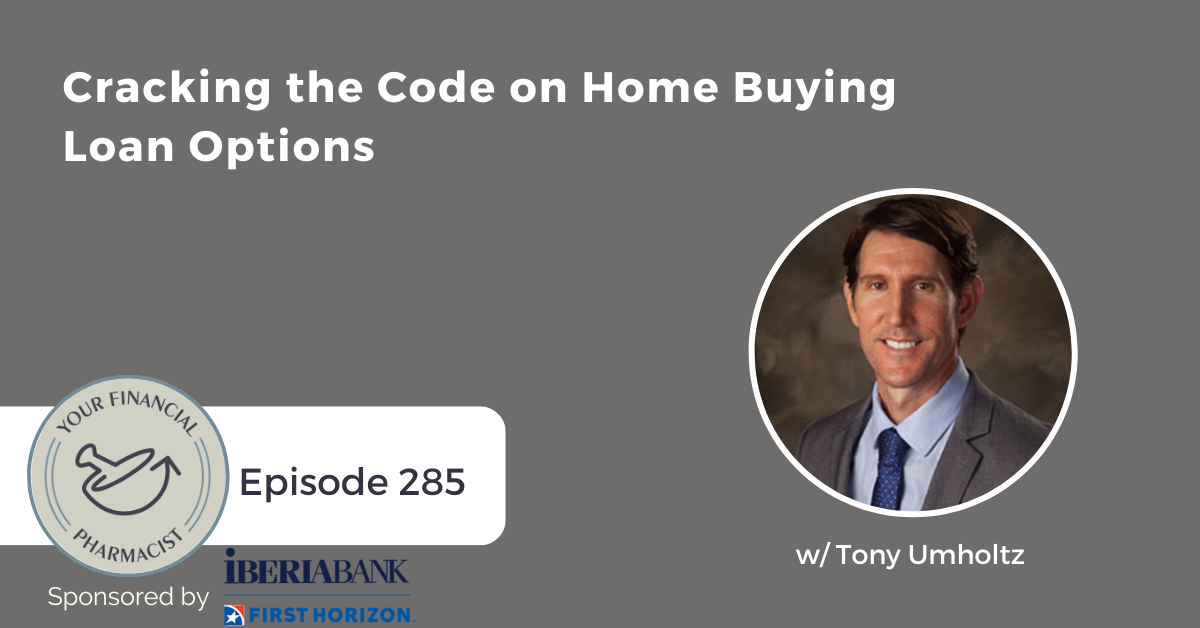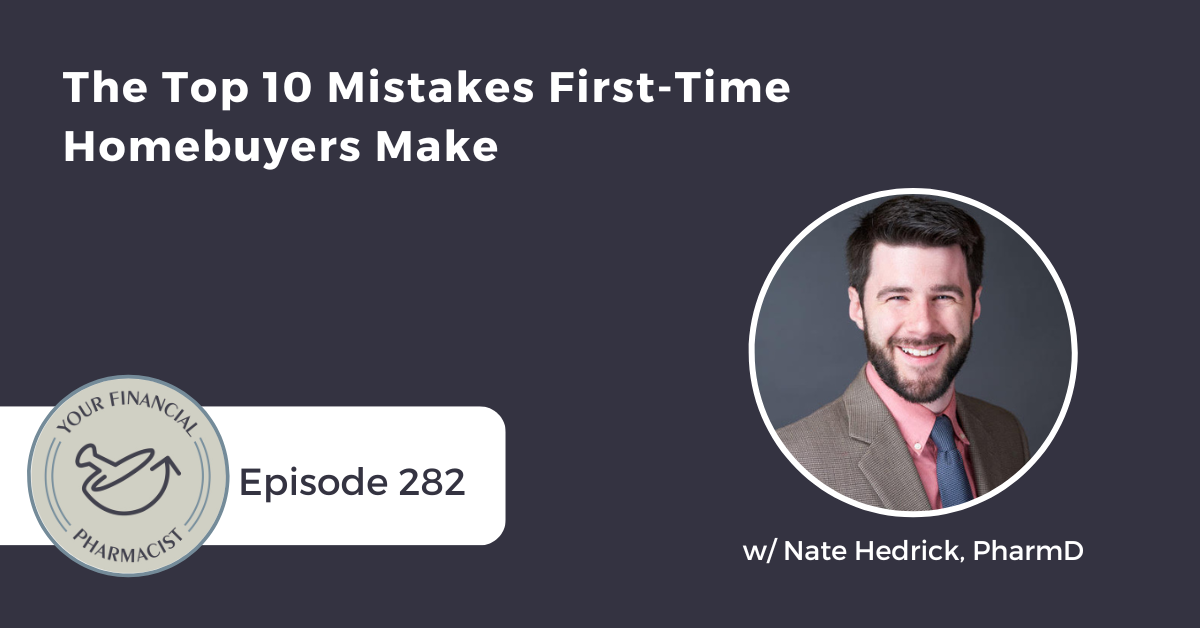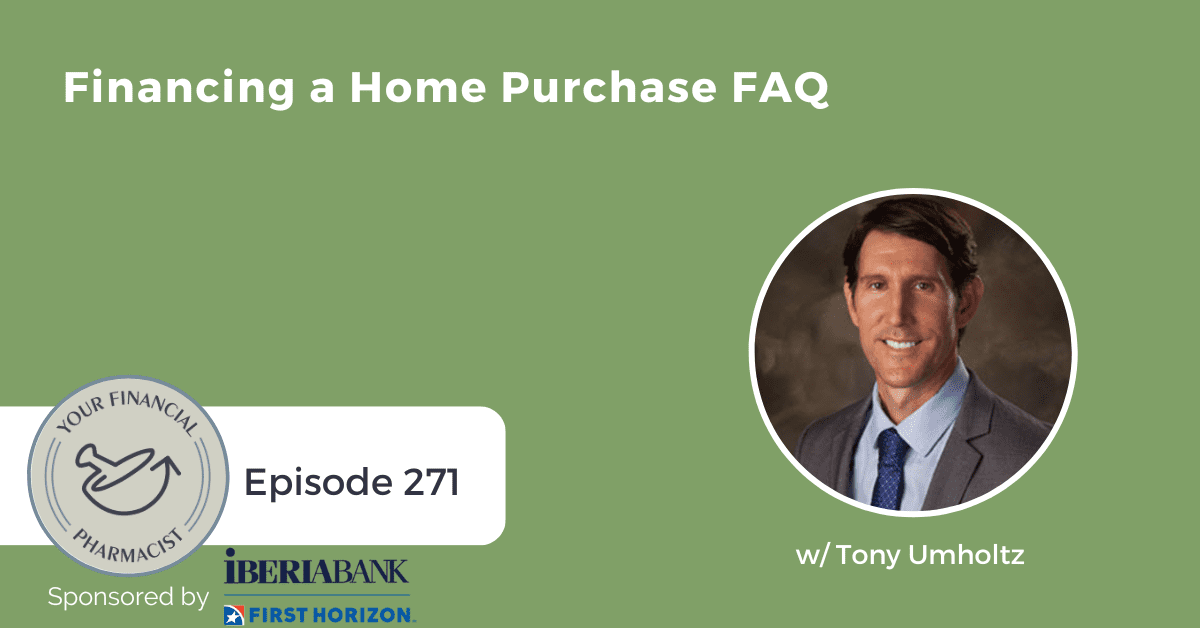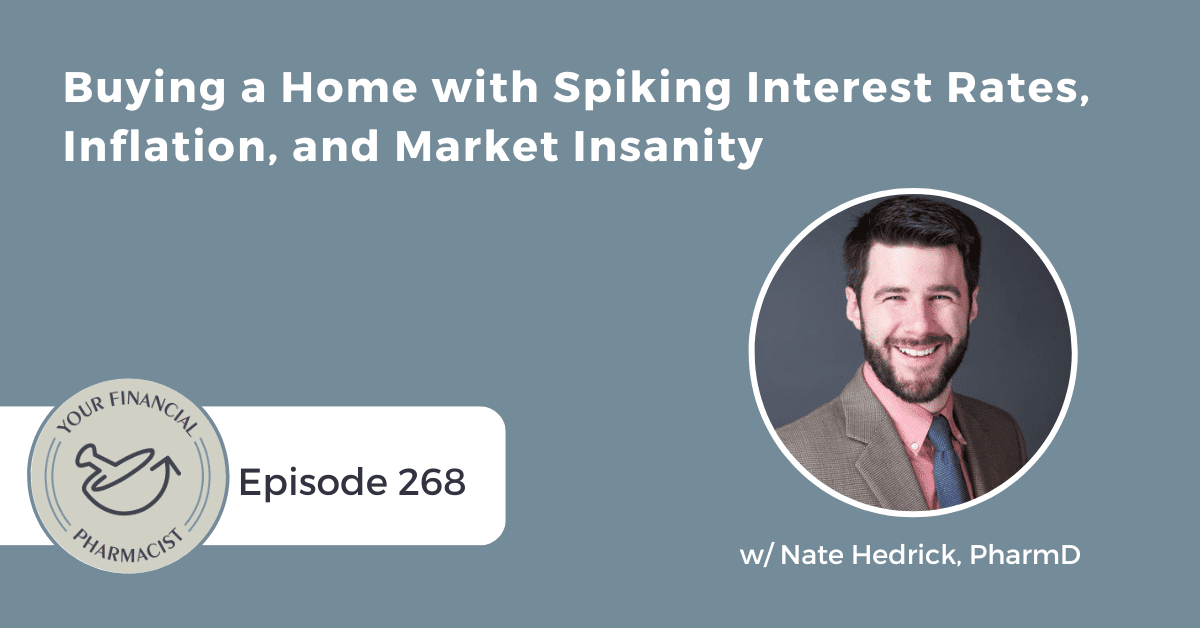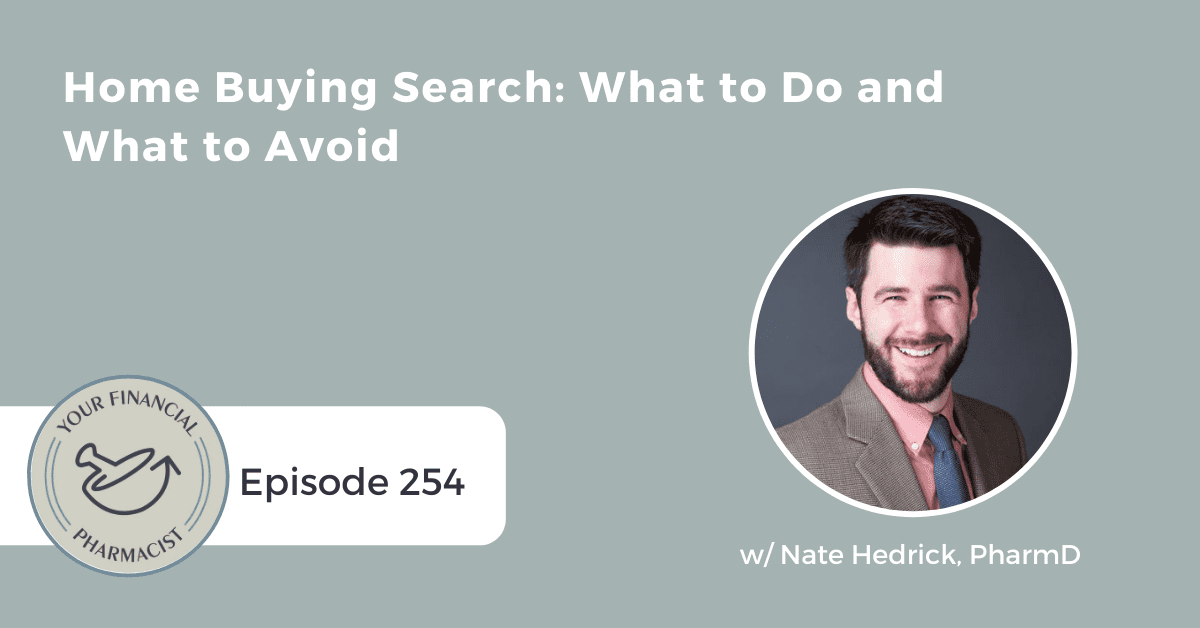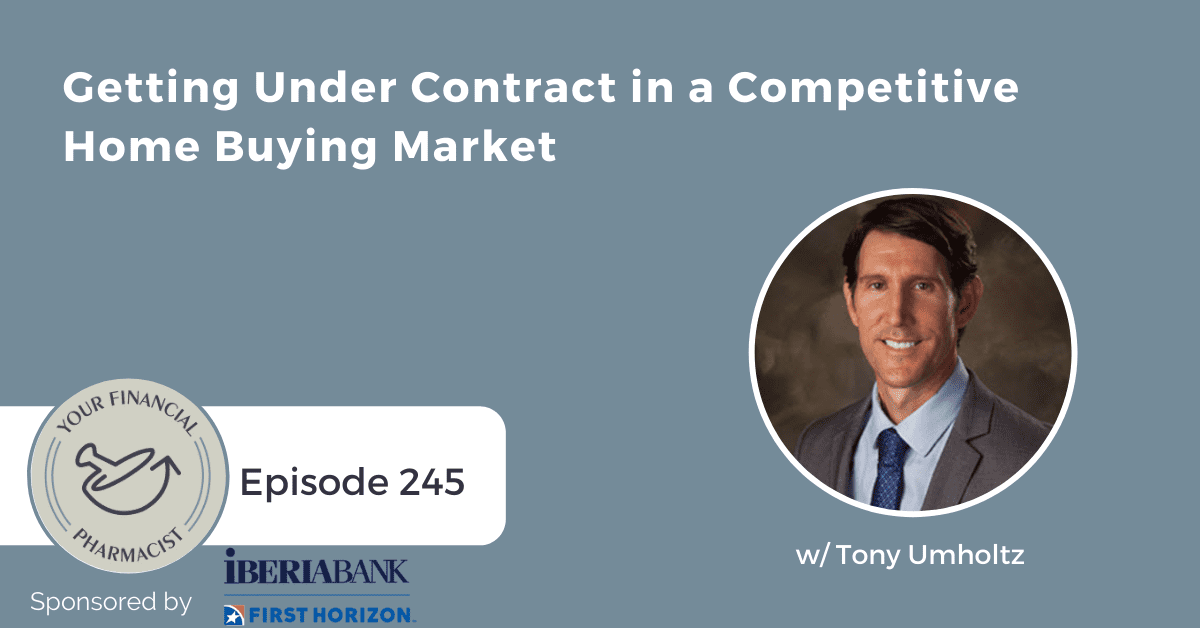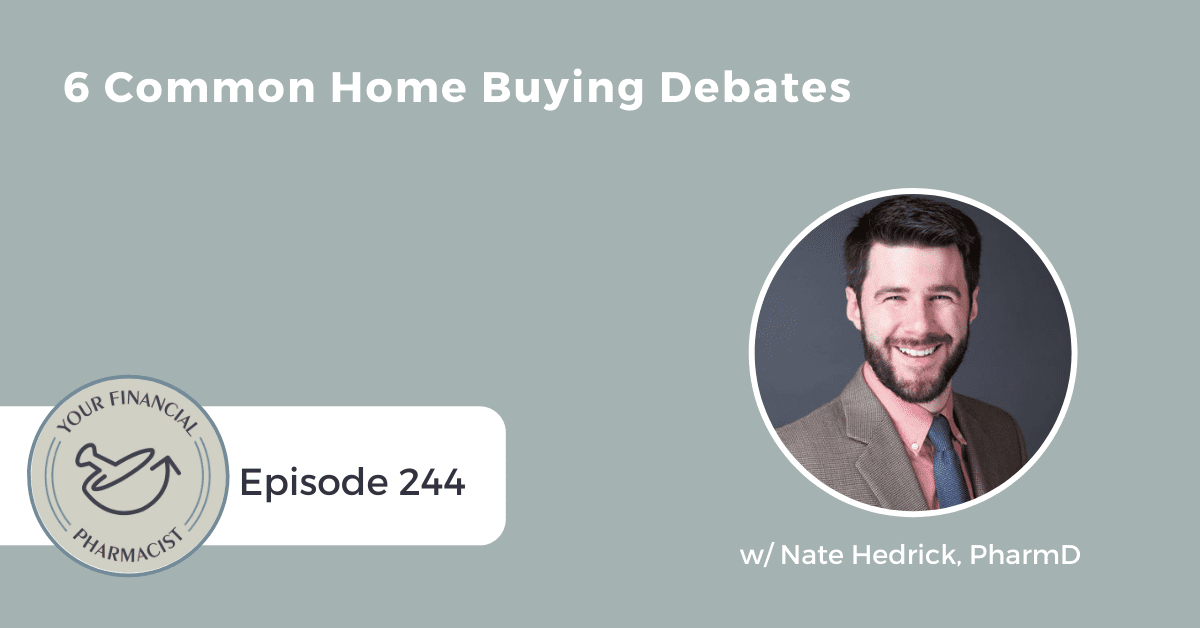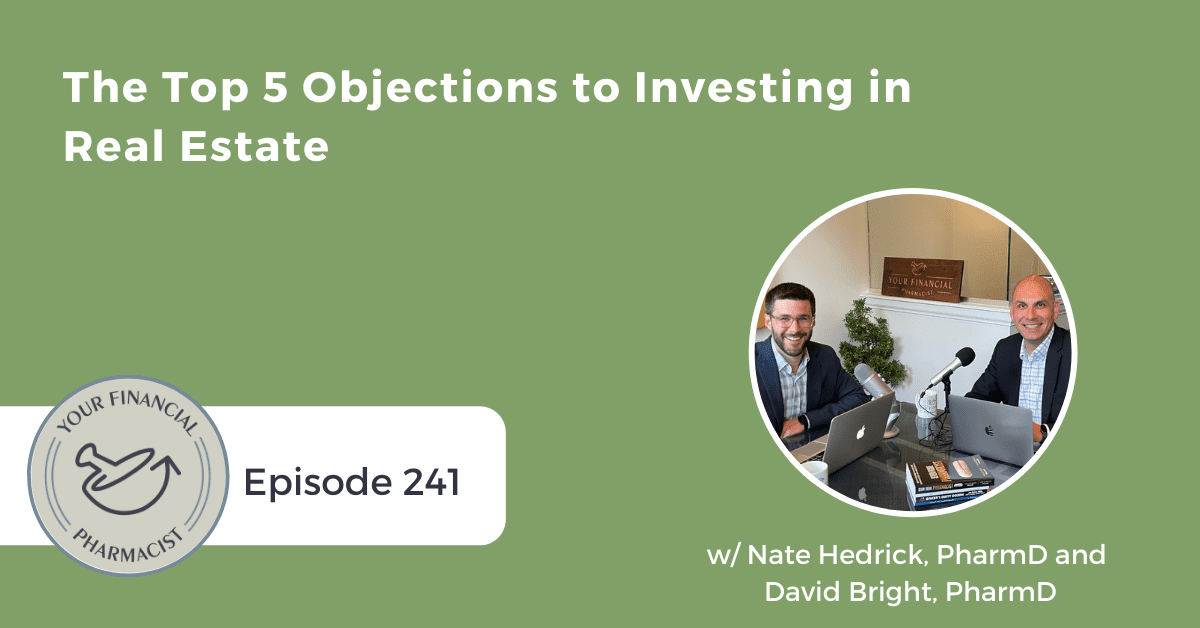On this episode, sponsored by The Real Estate RPh, Nate Hedrick, PharmD, The Real Estate RPh and co-host of the YFP Real Estate Investing Podcast, discusses home buying for pharmacists, how to determine if you are ready, how to find an agent, and much more.
Episode Summary
This week on the YFP Podcast, YFP Co-Founder & CEO, Tim Ulbrich, PharmD, has a chat with Nate Hedrick, The Real Estate RPh and co-host of the YFP Real Estate Investing Podcast, about home buying for pharmacists and the many considerations that should be taken into account when pursuing home ownership. With a focus on first-time home buyers, Tim and Nate cover knowing when you are ready to buy a home. They share the importance of having a solid financial foundation so that when you purchase your home, it doesn’t become an additional stressor on your financial picture. Nate shares his checklist for home-buying readiness, including tackling bad debt, having an emergency fund, building a down payment fund, and understanding why you want to buy a home. With many pharmacists impacted by the student loan pause, there is a discussion on preparedness for when that ends and how home buyers will have to plan for that change to the financial plan, including changes in the affordability of home buying. Nate touches on additional costs of home ownership that first-time buyers should be aware of and plan for, taxes, utilities, maintenance, and capital expenditures. First-time home buyers should also consider assembling a team for the home-buying process, starting with an accountability partner, a lender, and a real estate agent. Listeners will hear about lending options and words of wisdom from Nate on the real estate landscape in early 2023.
Links Mentioned in Today’s Episode
- Real Estate RPh
- YFP Real Estate Concierge Service
- Book Your Free Jumpstart Call
- Three Strategies for Buying a House with Student Loans
- Email Nate Hedrick: [email protected]
- YFP Real Estate Investing Podcast
- Homebuying Resources
- Your Financial Pharmacist Disclaimer and Disclosures
Episode Transcript
[INTRODUCTION]
[00:00:00] TU: Hello and welcome to the YFP Podcast. I’m Tim Ulbrich, and it’s great to have you here, as we strive to inspire and encourage you on your path towards achieving financial freedom.
Today, I’m excited to welcome back a friend of YFP, pharmacist, real estate agent, and real estate investor, Nate Hedrick, aka the Real Estate RPH. In this episode, we’re going to delve into the world of home buying for pharmacists. We’ll discuss what you need to know, how to determine if you’re ready, considerations for balancing a home purchase for student loans, the differences between lending options, and the various members to consider on your home buying team. Stay with us until the end of the show when Nate and I talk about the current economic environment that first-time homebuyers find themselves in and what to expect going forward.
Are you planning to buy a home in the next year or two? With the state of current home prices and mortgage rates, the home buying process can feel overwhelming. But what if you can leverage the knowledge and ongoing support of someone who has worked with dozens of other pharmacists through their home buying journey all at no cost to you? I’m talking about Nate Hedrick at the Real Estate RPH.
Nate is a pharmacist who has been a partner of YFP for many years now and offers a home buying concierge service that can help you find a high quality agent in your area and support you throughout the entire process. So head on over to realestaterph.com or click on the link in the show notes to schedule your free 30-minute jumpstart planning session with Nate.
[INTERVIEW]
[00:01:32] TU: Nate, welcome back to the show.
[00:01:33] NH: Hey, Tim. Always great to be here.
[00:01:35] TU: So today, we’re going to focus specifically on first-time homebuyers. Few areas we’re going to cover, how to determine when you’re ready, including rent versus buy, how to potentially balance a home purchase with student loans. I think, Nate, this is a timely topic, although we’ve addressed it in the past. We’re getting ready to come out of this freeze period. So I have a sense that this is going to be a topic that is top of mind for many folks again. Then we’ll also talk about the key differences between some of the lending options, a common question that we get. Hey, I’m looking to buy a home, looking for an agent. What are the loan options that are available? So we’ll tackle that as well.
Nate, we have covered this topic before. But you and I talked and really thought this is worth bringing back for a couple reasons. One, first-time homebuyers, we recognize that at the time we publish that content previously, they may not have been in a position to buy at that point. So we wanted to reach them in this moment. But also, there are just some factors right now that are unique. I mentioned one with the student loans coming back on board, waiting to find out when that will be and then also just the reality of the market.
We felt like this was worth coming back to, and I think that we want to make sure that we’re covering this topic well, especially for those folks that are looking to buy for the first time.
[00:02:47] NH: Yes. There’s been a lot of changes, just in the last six months, in market conditions and interest rates. Like pharmacy, right? It’s a dynamic space, real estate. So you can’t just set it once and forget it.
[00:03:00] TU: So let’s start with the elephant in the room, I think, when we talk about first-time homebuyers, especially relevant to today’s market. Should I rent? Should I buy? I think this is timely, not only because of interest rates, but also because of rising rent rates. I think that this is a topic we know we hear often from our community. So my question for you is in today’s market, how do you advise someone to think through this question, should I rent, should I buy, and really to keep the home purchase within the context of the rest of the financial plan?
[00:03:34] NH: Yes. You hit the nail on the head right there, Tim. I mean, this is such a – like any financial decision, you’re not going to make it based on one factor, right? You have to look at a number of factors. So things like how long do I plan to be in this area might be just one piece of this bigger picture of, well, is it worth it to buy here because I’m only going to be here for two years of residency or whatever.
Other questions become what is the local rent rate. Like you said, the rents have been going up just about everywhere, to the point where now mortgages are looking a lot more attractive. But you’ve also got this higher interest rate you have to deal with. Things are just getting pricier. So I think there are lots of different pieces that go into that financial decision, and it’s not just a one-size-fits-all. But really taking a step back and truly evaluating it.
I think the one thing that I see more often than not is people just kind of put a feeling into it and say, “Well, it’s probably cheaper to buy. So I’ll just do that.” Or, “It’s probably better for me to rent right now. So I’ll just do that.” But I really encourage clients and anyone I talked to to take a minute, sit down, figure it out. Look at actual numbers and then help make the decision using that information, rather than just kind of a gut check.
[00:04:39] TU: Yes. I love that, Nate. You and I have talked about this before, but I think there’s a underlying tone of like rent is bad. Buying a home, equity is good. We’ll talk about all the costs involved. But I think what you’re saying is really astute, which is like, hey, let’s put some numbers to that, that feeling, and that statement. Maybe that ends up shaking out to be true. Maybe it doesn’t, based on how loans are structured, based on how much we’re putting down, based on what else is going on in the financial plan.
Sometimes, it does make sense to stay where you’re at renting-wise. Especially, we see this in higher cost of living areas. We have a chance to work with a lot of fellowship programs, folks that are based out of Boston and the northeast. Buying a home is not a possibility as they’re getting started. Or if it is, they might be giving up, “Hey, I’m going to have to move an hour, hour and a half out, and then commute in.” So everyone’s situation is different. An important piece to keep that in mind.
What would you say makes your checklist? So if I’m talking with you, Nate, help me out, first-time homebuyer. I want to make sure I do this in a way that is wise, considering the rest of my financial plan. You’ve been through this. You get the chance to talk with prospective homebuyers all the time. What is that checklist that says, “I’m ready to buy a home.”?
[00:05:48] NH: Yes. It’s a great question. Like anything else, this is going to differ by person. But I think there’s kind of a core set of things that you should be looking at before you say, “Okay, yes. We’re ready to start down this road of buying.” The first thing I would look at is looking at “your bad debt,” right? So making sure that if you’ve got a lot of credit card debt or other bad debt sitting out there, don’t let that rule your financial plan, right? Don’t try to work around that to buy a home. It’s going to be a lot more difficult, and you can set yourself up for a lot more success if you get that bad debt going first. So that’s kind of an easy – I say easy, but it’s a good first step, at least, to get started.
From there, you really want to make sure you’ve got an emergency fund. This is more important now, more so than ever, because the way that the economy has been changing, the way the market has been changing, there’s a potential for more disruption, right? More chances for either a layoff or changes in hours or all the things that can happen that constitute an emergency. Those expound when you buy a house, right? You might have a furnace go out or a roof that needs to be replaced. There are lots of different things that can pop up. So making sure you’ve got that emergency fund as kind of your core, and it’s separate from your down payment fund, which is kind of the next step. But making sure that emergency fund is there first, and then start saving separately for down payment.
This is where I get the most resistance from people that I talk to is, “Well, that’s so much money to save up, Nate. You’re talking about maybe a $20,000 emergency fund and then another $50,000 down payment. How am I supposed to do that? I want a house now.” But truly, to really make sure that you’re ready, making sure those pieces are in place ahead of time is a key to success.
Then ultimately, once you’ve done all that and started down figuring those pieces out. Throughout that, you should be keeping your why behind buying in mind, right? This is not a decision, like I said before, that you can take in a silo. It shouldn’t just be, “Well, I want a house, so let’s go buy it.” Figure out what that why is. We want to set ourselves up for financial success. We want to rent this house out in the future. We want to be in this area for 10 more years. So it makes a lot of sense. What is that why? Then allow that to support all those other pieces before you ever start clicking through Zillow and looking at pictures.
[00:07:58] TU: Yes. You and I both know, right? Well, once that point comes, like we may say, “Hey, we’re going to buy in 6 to 12 months, 12 to 24 months.” Start looking on Redfin, Zillow, realtor.com, whatever. Man, three days later, we’re looking at homes, putting in offers. What just happened?
What I really hear there, Nate, is a theme of having a strong base, having a strong foundation so that when you move into a home, right? We’ll talk about additional costs here in a moment, but things will happen. Things will pop up, whether it’s unexpected costs, expenses, remodels, additional furnishing, or just life changing. We don’t want the home to become another stressor exactly of the financial plan.
So, yes, this takes discipline. We’re not suggesting that every penny of debt needs to be gone. We’ll talk about how to balance this with student loans. We’ll talk about different down payments that may exist. All of those are nuances and details that are really important. But more than anything, we want to be able to move into the home, have peace of mind. Let’s be frank. That’s becoming challenging in today’s market, right? Home prices are going up, which means down payments are going up accordingly. Interest rates are going up, which means monthly payments are going up. So we recognize the challenge with this.
But we’ve seen it in our own situations. We’ve seen it with thousands of pharmacists we’ve talked with and worked with, is that if we can keep this home purchase in check and in consideration with the rest of the financial plan, it’s going to give us a lot. Not only a peace of mind but also breathing room, as we look at accomplishing other goals. You said something earlier that I want to come back to in this checklist, which is potential timeline of being in the home. I underestimated that. I suspect this is common for first-time homebuyers. We look at a home. We say, “Yes, I think we’ll be here forever.” Then job opportunities come. Kids come into the equation. Things shift or change.
Really, when you look at the profitability, if you will, or the return on investment of the home, it really comes with a long time period of being in that home. So what advice would you have for folks that are thinking about the timeline, knowing every market is different? But is it five years? Is it seven years? What might be that timeframe when we think about closing costs and other things, that transition if it does happen isn’t going to set us back financially?
[00:10:17] NH: Yes. It’s, like you said, very specific, based on location, right, that there’s a common phrase? Real estate is local. So it definitely matters where you’re buying. I think the average in the United States is something like 2.8 or three years, something like that, is the break-even point, right? If you can stay in that house longer than three years, you’re good. If it’s less than three years, you’ve probably lost a little bit money.
That totally gets thrown out the window, though, when the market shifts like it has, right? If you bought at the beginning of 2021 and sold at the beginning of 2022, just a year later, you probably made bank, right? Appreciation was going through the roof, and so you did fine. Similarly, you might buy today and have to sell in six months, and you might lose 10% of value, right? There’s no way for us to know.
So you can prepare. You can plan. But as you said before, things are going to change, right? You might find a new job in two years that you had never anticipated. Now, you’re moving across the country for that, right? So you can try to set this up as best you can. Definitely look and use what information you have to make that decision. But don’t get so hung up on we have to plan to be here for five years. If we don’t, it’s not worth it, right? Because that’s just going to make the decision more stressful. Plan with the information that you have and then kind of roll with the rest.
[00:11:28] TU: I think this is another vote in the bucket of making sure that we’ve got a solid savings plan and solid emergency fund, additional savings. Because from personal experience, when you move, it’s not just the closing costs. It’s not just, obviously, the fees that are associated. But it’s the physical move. It’s the, “Okay, we’re in a new home. We want to make some updates. We need some new furniture.” Depending on the size of the property and so forth, taxes may change. Insurance policies may change.
That takes me to my next question for you, which is around some of the additional costs of homeownership that I think, speaking from personal experience, when you’re going in this as a first-time homebuyer, you tend to overlook these because there’s so much excitement around getting in the home. Personal finance, author, speaker, podcaster, Ramit Sethi, talks about estimating an additional 40 to 50 percent of the mortgage payment for these additional homeownership costs, things that he calls phantom costs, right? Taxes, insurance, maintenance, furnishing, utilities, lawn equipment, et cetera. What are your thoughts on that number, and what folks need to be thinking about here?
[00:12:32] NH: Yes. That’s probably not far off. I mean, if you look at the average mortgage payment, just the mortgage payment by itself, it’s right around 25 to 28 percent of the typical American’s income. That’s what they spend on just their mortgage payment. If you look at what they’ve spent on housing expenses, it’s closer to a full like third or more of their full income is going toward their housing expenses. So there’s a big chunk of that other stuff that’s not just in a net mortgage payment.
I know when I was buying my first home, the things I missed, just because, I don’t know, I didn’t know what to look for, were the simple stuff like property taxes, right? I never paid property taxes in my life. I’ve rented forever. Now, I’m 22 years old or whatever, buying a home. All of a sudden, I have this every six-month bill I have to deal with, right? I didn’t expect that. Something simple like utilities too. Those might be baked into your rental costs today, right? You might have to cover sewer or water or trash or electric. Or maybe you’re just paying for Internet today, right? All those utilities become yours.
Then the biggest thing, maybe the most obvious but also the most expensive is the maintenance and capital expenditures. So this is the regular everyday stuff that breaks and you have to replace, but also the big ticket items, right? The roof, the driveway, the furnace, all these larger dollar expenses that can pop up. I’ll give you an example from our own life. We were sitting having dinner the other day. Our like sort of dining room/kitchen area has this big, gorgeous window that looks onto our backyard. It’s like five-foot by four-foot, this huge window. In the bottom left corner, I saw a crack in the window, like in the actual glass itself. I’m like, “Oh, my gosh. We need to look at that.”
So then the next morning, we get up and the crack is clear to the middle of the window. It’s like, “Oh, shoot.” So we were like, “Okay. Well, I guess we have to replace this window,” which I hadn’t done in our house before. We got a couple of different options. One person that wants to replace the glass, somebody else that wants to take out the whole window and install new windows, right? All these different things. It’s anywhere from like 1,000 to 3,000 dollars, depending on what thing we pick.
It’s like, “Whoa.” Okay, this just went from a small crack we noticed at dinner to, “Here’s $3,000 expense, potentially.” So those are the kinds of things that can spiral. If you’re not planning for it, it can really make or break your budget every month.
[00:14:41] TU: That’s such a great example. Sorry, you guys had to go through that. But that is the things that just happen, right? I think we think about objectively looking at the numbers. Speaking from personal experience, when we made that decision to go from rent to buy, I looked at the mortgage payment. I looked at the interest. I looked at the taxes. I looked at the insurance, which is a good start. But I vastly underestimated all these other things that we’re talking about.
Some of them are things that we just have to expect are going to happen, right? You mentioned the big ones; the roof, the furnace, et cetera. But then there’s just kind of the normal wear and tear or, “Hey, we want to make some updates and upgrades.” As much as we tell ourselves like, “Hey, this is the home as is. It’s our forever home,” like human behavior is you’re going to want to make some updates. You’re going to want to make some changes. So if we can plan for these and have margin in the budget, going from a rent to buy situation.
Does the budget not only allow for the principal, the interest, the taxes, and the insurance? But does a budget also allow for some of these other expenses and planning for these things along the way? Again, we want to be in the home, enjoying that large biggest purchase we’re going to make without having the additional stress of like, “Ah, cracked a window. This is now a headache.”
[00:15:57] NH: Something we stole from Tim Baker, actually, and that has been really helpful for us is we have a bucket in our ally accounts. One of our ally accounts is just for home stuff. There’s something powerful about seeing that money go in there and seeing that fund kind of increase and then ultimately decrease when you have to fix something. That makes it more realistic. If you just kind of roll those expenses into your budget every month, it’s easy to overlook them. But if you can plan ahead and actually see those dollars going in and out, it makes it a lot more real.
[00:16:23] TU: Yes, absolutely. All right. So we’ve talked about the expense associated with the home purchase, some of those that are obvious. Maybe some of those are not as obvious. We’ve talked about the readiness to buy, evaluating that rent versus buy. Let’s talk about putting together a team, Nate. I think this is a piece that we get on. We start driving around neighborhoods. We start looking on websites and looking at homes. All of a sudden, we’re off and running. We may not take the time to step back and say not only what is the why, right? What’s the big picture? What are we trying to accomplish? But who do I need on my team before I get too far in the process, and things kind of take off?
When you think about assembling a home buying team, why is it important to have that team in place? Ultimately, who is on that team? Who are the members that are part of that?
[00:17:11] NH: Yes. This is something that I know when I bought my first house, I sort of overlooked or kind of ignored. Probably because even though it was being recommended to me like, “Hey, Nate. Make sure you assemble your team before you get started,” that just sounds overwhelming. It sounds like it’s something I don’t know how to do. What I do know how to do is go on Zillow, see a house that I like, and show up at an open house, right? That’s easy. I can do that.
But what I encourage and what I talk to a lot of my clients about is try to build this mini team in advance, and it will just make the whole process that much easier and smoother. It doesn’t have to be a big ordeal, right? Start with just an accountability partner, right? That’s the first member of your team. This could be a spouse. This could be a parent. This could be a sibling. Somebody that maybe either is or is not involved in the transaction that can be that accountability piece.
I told the story before. But when my wife and I bought our first house, one of the first houses that we really liked was this gorgeous property on like 15 acres, right up, backing up against Cuyahoga Valley National Park here in Cleveland, just absolutely gorgeous property. We fell in love with it. It was way outside our budget. The house was literally falling down. Until we brought our parents out to come like see it for a second showing, and they clearly thought we were insane, we couldn’t see it, right? It was just too easy to get enamored by the vision that we had rather than the reality. So get that accountability partner first because that can really make decision making easier and get you back on track.
From there, the biggest pieces you need from there are really a lender and a real estate agent. I typically recommend people get one or the other first. Then you can kind of expand from there. Good agents are going to know good lenders. Good lenders are going to know good agents. But the agent is the one you’re going to be working with on a daily basis. So if you have to pick one, I generally recommend going with the agent first, and then letting them recommend several lenders and shopping around for that.
That’s typically where the team starts. Then you can expand with needs beyond that, right? You might need a financial planner. You might need a lawyer. You might need a tax professional. All of those people are people you can add on to the mix. But for truly the initial process of buying a home, start with that agent, get that lender, and then start to expand the team from there.
[00:19:16] TU: Nate, I love what you share here with starting with an accountability partner, whether that’s someone involved in the process or not, right? Because I think that reinforces what you’re saying earlier about defining the why, someone who can really help ask good questions, get you thinking more about that. But that also maybe can be a little bit prodding where needed about, “Hey, we’re looking at this beautiful property in Cuyahoga Falls. Yes, the land is perfect. We have this amazing vision. Hey, Nate and Kristen. Have you guys thought about like what it’s going to take the managers to repair it, remodel it? What does this mean for the rest of the financial plan?”
We had a very similar experience. We looked at a property up in Northeast Ohio. I remember vividly. Jess and I walked in. It was kind of a huge lodge type of property, really open. As many warts as there were and the costs that it was going to take to get it up and running, of which we have no – not only that financial means. We have no handiness in any bone of our body, let alone wanting to kind of manage that and take the time. But we just went in eyes wide open of like what this could be.
Thankfully, we kind of eventually got off that ledge and looked at something that was a little bit more reasonable. But I think that speaks to some of the emotional sides, especially on the first-time homebuyer, and how important it is to have that partner. That, once you then define the framework of, “Okay. What are we looking for? What’s the budget? What’s the game plan? How does this fit within the financial plan? Okay. Now, let’s move forward with selecting an agent. Let’s move forward to looking at lending options.”
Because I think we see this over and over and over again because of good marketing practices and other things. Someone is often running with a bank. We have to remember that that bank, that institution, as nice of a person as they are, they aren’t asking you all the questions about how is this best going to fit in with your long-term financial plan, your long-term goals. Sure, you might get approved. We’ll talk about lending options here in a moment. But that doesn’t necessarily mean it’s a good fit for your personal situation and the overall financial plan. I can’t say enough about the team and making sure you’ve got that accountability partner and that the folks are there that are going to help you ensure that this lines up with your long-term plan.
Nate, let’s talk about the loan piece. I think for many pharmacists, this is where we’re itching to get started. We want to know what’s the best rate, how much do I have to put down. Conventional approach is 20% down, which allows for no PMI, no private mortgage insurance, a healthy cushion in terms of equity in the home, if for whatever reason the home drops in value, or you end up moving, needing to tap into equity. But it feels like more and more borrowers are seeking an option that is less than 20% down. I suspect this is coming from a few different areas.
One, the desire to buy a home. We’ve talked about that, right? To get out of a rental situation. The second, I think, is that because of rising home costs, that means that if we hold true to that 20%, that’s going to take more to save for that down payment. It’s going to take longer. Then the third is, I think, for many pharmacists, first-time homebuyers, student loans are eating away at their ability to be able to save for that down payment. So home prices are going up, 20% takes longer to save. Because I have these pesky student loans, it’s harder to save for that down payment. So would you agree? Is this a trend that you’re seeing in terms of a shift away from that conventional 20% down?
[00:22:38] NH: Yes. I do see quite a bit that he’ll move in that direction. Some of it is simply because, like you mentioned, the rising depreciation we saw over the last two, two and a half years completely outpaced people’s ability to save. I mean, if you were – let’s say you were saving $1,000 a month, right? That’s a really nice chunk of change you’re setting aside every single month for a down payment.
But home prices are appreciating at 20% a year in 2021 and about 22% a year in 2022. Unless you’re adding another $200, another $200 every single year on top of those monthly payments, you’re not going to catch up. You’re actually losing money toward your down payment, just by appreciation outpacing you. So that alone is forcing a lot of people in all buying points, at all price points to say, “Well, what other options do I have? Can I spend less upfront and then just ride the monthly payments out over the long period?” Yes, we’re absolutely seeing that, and people are just looking for new options.
[00:23:38] TU: Let’s get to that here in a moment. What are those options? What might be the pros, the cons? What do we want to be thinking about? But I want to first address the student loans. This has become – prior to the pandemic, I would say this is an issue we’ve heard over and over and over again. Hey, I’m itching to getting a home. I’m looking to buy a home. But the student loans are really a big barrier to allowing myself to either fit this into the budget or be able to save for that down payment.”
That tone has shifted because of the pause now for three years. Obviously, that’s going to be ending here in the foreseeable future, unless something changes, which it could. But I want to talk about this balance. You wrote a blog article on this topic, balancing student loans with the home purchase. We’ll link to that in the show notes. But what advice at a high level would you have for our listeners, as they evaluate their options with buying a home with student loans, also knowing that we might have folks that haven’t been used to making payments for the past three years that are now going to be entering back into those payments?
[00:24:35] NH: It’s actually something that I’m worried is the wrong word but I’m concerned about because there are so many people out there today that either have bought a home, where they have entered into a rental situation sometime in the last three years and have not taken stock up their loan payments or what they’re going to be. I think if there’s one thing that people are missing more than anything right now, it’s that they’re pretending those don’t exist because they don’t exist today. I think that’s really dangerous.
If you look at how the lenders were handling these over the last couple of years, most lenders were basically taking your loan balance. Let’s say you have $100,000 in loans. They were saying, well, one percent of that is going to be your payment, right? We’ll just guess one percent. Some lenders were guessing half a percent, and they didn’t even look at what your actual payment was. They just guessed, right? They just picked a number and rolled with it.
Again, I think that if you’re not paying attention to that and then you suddenly restart, you could find yourself very, very house poor or just in a situation where you’re not prepared for that level of financial strain. So if there’s one thing you can do in terms of the loans right now, it’s look at what your actual payment is going to be, figure out what that number is, and build it into your budget. If you really want to stress yourself out and stress the finances a little bit before you make that home purchase, put that money that that loan payment is going to be into account that you that you can’t touch, right? Just throw it into a new ally account or a new bucket, and pretend you can’t touch it at all.
Make sure everything still works without you being able to touch that because it’s coming back, right? Just banking on the fact that it’s going to go away is not going to set you up for success. So that is definitely an important piece to keep in mind.
[00:26:07] TU: Yes. We got to build that muscle right now, right? I think what’s happened is it’s been an incredible benefit. Zero dollar payments, zero percent interest has been incredible, if we’ve been allocating those dollars to other parts of the plan, expecting it to come back at some point, budgeting accordingly. But I think the unintended consequence has been with multiple extensions of the pause. With each one, it’s becoming more and more, as you alluded to, like pretending that they may not be there.
This is the moment to start building that muscle back up if we haven’t been. For those that are looking, I think there’s the consideration for those that are in a home, that bought a home when the pause was happening. Then I think there’s a consideration for those that are looking to buy a home and have yet to have their student loans start back up or start for the first time as well. What you’re saying is just such a classic example of trying to avoid the trap of looking at any one part of a financial plan in a silo, right? So we’re looking at the overall budget. We’re looking at the impact of the student loan payment. How do we address those student loans, right?
Someone who pursues a loan forgiveness strategy, income-driven repayment plan, what they may or may not be able to do on a home is very different than someone who’s looking at an aggressive debt payoff period. So how you tackle your student loans and the repayment plan you choose is going to have big implications on what that means to the budget, which, of course, connects to what you’re going to be able to afford and look at on the side of the home buying. Great reminder. We’ll link to that article again in the show notes. I think it’s really relevant, as folks start preparing for this pause to pick back up.
[00:27:42] NH: Yes. Keep in mind, something – I don’t want to sound all doom and gloom, right? You can absolutely purchase a home with student loans. Just don’t ignore them, right? We bought our first house and had tons of student loan debt still. It’s absolutely doable. What I’m concerned about is people that are ignoring it and pretending that it’s not coming back. That’s where you can fall into a trap.
[00:28:00] TU: Yes. We got to look at the numbers, right? Look at the budget. Kind of objectively see what’s there. So at a broad level, Nate, define the different types of loans that are available. We talked about conventional 20% down, no private mortgage insurance. But again, we see more and more folks are pivoting away from that. So that certainly is one option. What other options are out there that individuals should consider before they kind of get off and running with any one individual lending institution?
[00:28:27] NH: Yes. I think, typically, when I’m talking about loans, I break them down into three types. Obviously, not a lender, right? Real estate agent and pharmacist but not a lender. But the three basic types that you’re going to deal with are what we call conventional loans. This is typically your 20% down, maybe 10% with PMI. But these are kind of your good credit score, run of the mill. Every bank has them type of loans, right? Conventional loans, and they’re backed by Fannie and Freddie Mae or Freddie Mac and Fannie Mae. Excuse me. Those are going to be just, again, standard underwriting practice, right?
You’ve also got government-backed loans. These are those that are attached to some sort of government-backed program. Either these are FHA loans, or these are USDA loans or VA loans. But there’s some sort of government-backed entity with these, and you might need to qualify for those, in the case of like a VA loan. Or you might just be able to offer this up through a certain type of lender. So those are available. Typically, the advantage of these loans is a lot lower down payment. But you might have different terms and a higher interest rate. Or you’re paying private mortgage insurance or things like that.
Then the third type is kind of a hybrid. Really, it’s closer to a conventional loan, but that is a professional loan. We’ve got lots of different types of these. The ones that most of our audience would be dealing with as a pharmacist is home loan, but they’re also called physicians’ loans or doctors’ loans. The idea is that you’re taking the conventional loan product, and you’re underwriting it using the fact that the person buying the home is going to be a physician or a pharmacist, right? There’s a lot more earning potential there, a lot more stability in their career, a lot more income-earning potential down the road. So they underwrite those a little bit differently.
Typically, what that means is that you can get the lower down payment of a government-backed loan, but you get the conventional terms that come with a conventional loan. So you get no PMI, for example. Or you get the lower interest rate that others are getting. So there are some advantages there. Each one of those loans has an advantage and a disadvantage in certain situations. It’s really on the individual to evaluate those with somebody that knows what they’re doing to make sure that you’re finding what the right product is for you.
[00:30:28] TU: Which comes back to the advocate or an agent like yourself that really has a good look into these different types of options. It can be a third party to have you thought about this because there’s really, you said earlier, the suggestion of looking at multiple lenders, which I certainly would agree with. I would add on to that looking at multiple lending options with multiple lenders, right?
We’re talking about conventional loans, government-backed loans, pharmacist home, doctor type loans. All of those differ, as you alluded to, in terms of down payment, potentially the interest rates, the nature of loans, it fixes a variable, and then, obviously, credit scores, other factors as well. So I think what I’m trying to advocate for is to really do that homework. Work with someone that can help you understand those options. Do your research because once you’re running off with a lender, at that point, you’re starting to really kind of box yourself into one option. So making sure you’re looking at the full spectrum of options before you move forward.
[00:31:28] NH: This is where a really good agent can start the conversation in the right direction too, right? As real estate agents, we are not lending experts. But we know a ton of lending experts, right? So if a client comes to me and says, “Hey, Nate. I’m thinking about buying a home. I’ve only saved up $10,000 for my down payment, and my credit score is not that great,” well, that’s fine. Let’s see if we can make that work. I’m going to get you in touch with three of my favorite FHA lenders. Talk with each one of them, explain your situation, and let’s see what that looks like, right? We can guide people to the right individuals to get that information, rather than having them just guess and start Googling things.
A good agent, if you’re not sure what the lending process or not sure which the next step is, start with a really good agent. Explain your situation. While they are not going to be able to give you all the answers themselves, they’re going to know the right people to talk to so that you can get those answers from the right individual.
[00:32:16] TU: For folks that are going through this right now or looking to get started here in the near future, as we mentioned on the introduction, Nate can really be that advocate for you. So we built through the home buying concierge service. Nate can connect you with an agent all across the country. So you don’t have to live just in Northeast Ohio to be able to tap into Nate’s expertise. Regardless of where you’re buying a home across the country, he’s vetted agents in certain areas is there to be alongside of you in that journey to talk about lending options, to answer questions that you have, and to be the advocate that he talked about earlier.
We’ll link to the page. You can get in contact with Nate in the show notes. You can also email him directly. We’ll link to his email address. I think that’s a great first step for folks that are getting started on this journey. Or as we talked about before, even if you’re thinking, hey, six months out, 12 months out, we know that timeline can collapse. So it can’t hurt to start the conversation now as well.
Nate, let’s wrap up by talking about some current trends, right? The past couple of years, since the pandemic, I would say is an understatement, have been a whirlwind, limited supply, high demand. You talked about the appreciation rates, rising interest rates. I think this creates an overwhelming situation for many first-time homebuyers. Here today, we’re recording today. We’re expecting an announcement on a jobs report, which the Fed is looking at, based on that what they’re going to do to be more or less aggressive on interest rate hikes.
There’s news that’s coming out daily that I think for first-time homebuyers, it’s like, geez, not only is the price going up. The interest rates are going up. We’re talking about student loans starting. So my question is if you had to look at your crystal ball, we won’t hold you to it, what is the outlook potentially? I’m a first-time homebuyer. I’m listening. I’m looking maybe this spring, this summer, next fall. What words of wisdom would you have for them, as they look at this pursuit of buying a home?
[00:34:05] NH: Yes. Like you said, no crystal ball, but at least the pulse that I’m getting. David and I on the YFP Real Estate Investing Podcast are lucky enough to talk to individuals from all over the country in all different walks of life, and understanding the lending and the markets and different agents from different locations. So that helps to give us a better perspective on kind of nationally what’s happening.
What we’re seeing right now is that most markets in the last three to six months have pulled back in their valuations. Some have been flat. Like here in Cleveland, we’re actually flat to up. I think we’re up like two percent year over year or something like that. So we’re very, very small increase year over year. But then there are some markets like Houston who pulled back 20% or more. It’s just incredible.
So a lot of that, again, goes back to what I said earlier about real estate is local. So understanding your local market can help you make a decision moving forward. What we’re seeing right now is that pullback or that flattening is making it a little bit more affordable, as the people save up more money and the appreciation isn’t outpacing them nearly as much. It’s making it a little bit more affordable to buy. But there is still a supply issue. We’re still dealing with a lot of people that aren’t ready to sell because if they sell, they have to go buy something else with a higher interest rate.
We talked about this on the show before, you and I, about if you had a three percent mortgage today, and you switch to a six percent mortgage somewhere else, you could have a much, much less expensive home but the exact same monthly payment, right?
[00:35:32] TU: Yes. There has to be a really compelling reason to move, right? When you’re going for – yeah.
[00:35:35] NH: Exactly. That’s hurting supply a little bit. I don’t think I see that getting considerably better until the end of the year. So what we’re seeing right now, and again it varies based on location, is that houses are still coming on the market. They’re a little more affordable, just because their prices have not continued to skyrocket. But the limited supply is still creating competition out there. I wish I could say it’s 100% better than it was last year. It’s better and it’s still not a bad time to buy. But the competition is still out there.
I mean, I offered on a house yesterday with a pharmacist. It came on the market two days ago. We put an offer in. There was a three o’clock deadline. We were almost six percent over listing price on our escalation clause, and we still lost it to somebody else who waived inspections. So like that’s still happening. It’s still out there. It’s getting better, but we’re not quite there yet.
[00:36:25] TU: Yes. I’m glad, again, to your point. Everything’s local. But that one example really highlights, I think, something important for folks that are on the front end of this journey as you’re looking. I’ve almost now, Nate, as I just observe homes and kind of keep an eye on what’s in the market, whatever I see is the list price, I just increase in my mind, right? I think that maybe that’s true in some markets, more so than others. But what I’m getting at is there can be a very creepy and effective looking of, “Here, our budget’s 300. Well, why don’t we put the search range like up to 350?” Then we go see the home that’s 350. Really, it’s going to take 380, 400 to get that home, right? All of a sudden, we’re $100,000 off what we had budgeted.
Again, I think finding someone on your team that can really help you understand the local market, what is happening in terms of putting together competitive offers, how far above our homes typically go into value, and then working that in your plan to make sure you’ve got a realistic view of what it’s going to take as you make that purchase.
[00:37:21] NH: There are opportunities out there too. I mean, we’re still seeing deals where a house is sitting on the market for a couple of weeks because maybe they overpriced it to begin with. It loses that initial flurry of activity. I mean, we as agents know that the first three weeks of listing a home are the most important, right? If you don’t sell in that first three weeks, right now anyway, your chances of selling it list price go down dramatically, and they just drop and drop.
If you’re someone out there looking for a home and you’ve not had success so far, and again this is going to vary by location, but what I’m encouraging some of my clients to do is look at those houses that have been in the market for two months. Those are the ones where you can potentially go find a deal because they initially overpriced it. They thought they were going to sell in a week. Now, it’s eight weeks, right? That’s where you can come in and make a deal.
I’ve had success with clients offering on those properties and actually getting quite a bit off of that listing price. So it’s softening, but it’s not anywhere near where we want it to be yet for the buyers that we’re working with.
[00:38:13] TU: So stay tuned. We’ll have Nate back on the show this year as well. Again, we’ll link to his information in the show notes, his email address. You can go to yourfinancialpharmacist.com. You can click on home buying. You can get to Nate that way as well.
Nate, as always, great stuff, and I appreciate the perspective you bring on this important topic to our community.
[00:38:31] NH: Yes. Thanks for having me on, Tim.
[00:38:33] TU: Nate and I have covered a ton of information in this podcast. So imagine working with Nate one-on-one through your home buying journey and having his support to give you much needed peace of mind. We know many pharmacists want to feel confident about big financial decisions, including a home purchase. So if you have fears of being house poor, concerns about the impact a home purchase might have on your other financial goals, Nate and his home buying concierge service can help, all at no cost to you. You can visit realestaterph.com or click on the link in the show notes to schedule your free 30-minute jumpstart planning session with Nate.
[END OF INTERVIEW]
[00:39:12] TU: As we conclude this week’s podcast, an important reminder that the content on this show is provided to you for informational purposes only and is not intended to provide and should not be relied on for investment or any other advice. Information in the podcast and corresponding materials should not be construed as a solicitation or offer to buy or sell any investment or related financial products. We urge listeners to consult with a financial advisor with respect to any investment.
Furthermore, the information contained in our archived newsletters, blog posts, and podcasts is not updated and may not be accurate at the time you listen to it on the podcast. Opinions and analyses expressed herein are solely those of Your Financial Pharmacist, unless otherwise noted, and constitute judgments as of the dates published. Such information may contain forward-looking statements that are not intended to be guarantees of future events. Actual results could differ materially from those anticipated in the forward-looking statements. For more information, please visit yourfinancialpharmacist.com/disclaimer.
Thank you, again, for your support of the Your Financial Pharmacist Podcast. Have a great rest of your week.
[END]
Current Student Loan Refinance Offers
Note: Referral fees from affiliate links in this table are sent to the non-profit YFP Gives. | Bonus | Starting Rates | About | YFP Gives accepts advertising compensation from companies that appear on this site, which impacts the location and order in which brands (and/or their products) are presented, and also impacts the score that is assigned to it. Company lists on this page DO NOT imply endorsement. We do not feature all providers on the market. |
$750* Loans ≥150K = $750* ≥50K-150k = $300 | Fixed: 4.89%+ APR (with autopay) | A marketplace that compares multiple lenders that are credit unions and local banks | ||
$500* Loans ≥50K = $500 | Variable: 4.99%+ (with autopay)* Fixed: 4.96%+ (with autopay)** Read rates and terms at SplashFinancial.com | Splash is a marketplace with loans available from an exclusive network of credit unions and banks as well as U-Fi, Laurenl Road, and PenFed |
Recent Posts
[pt_view id=”f651872qnv”]

